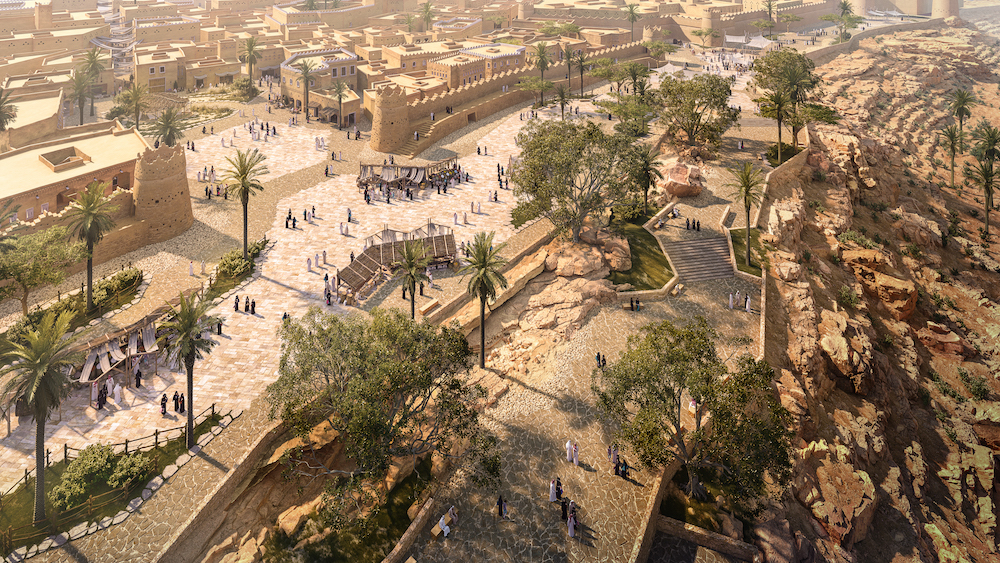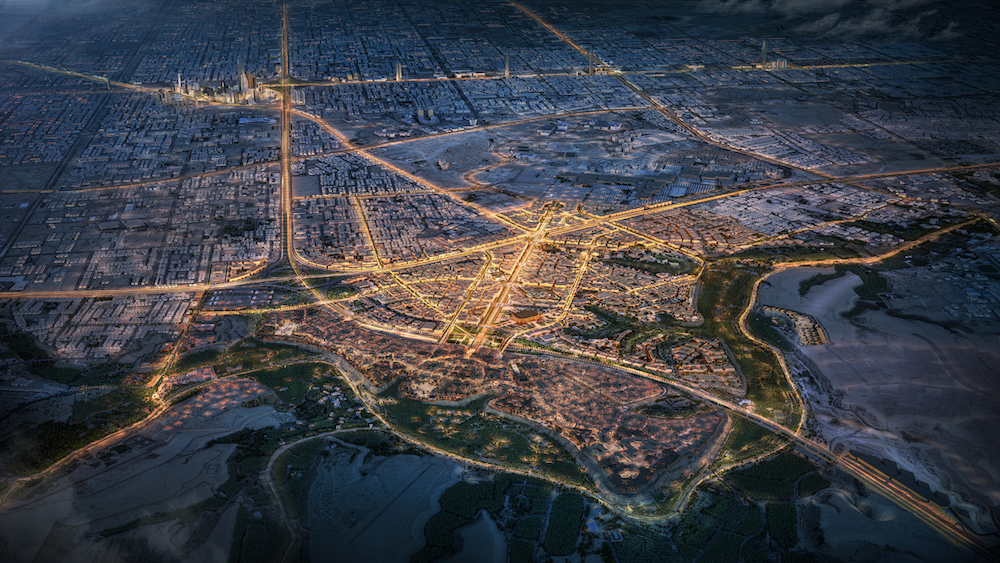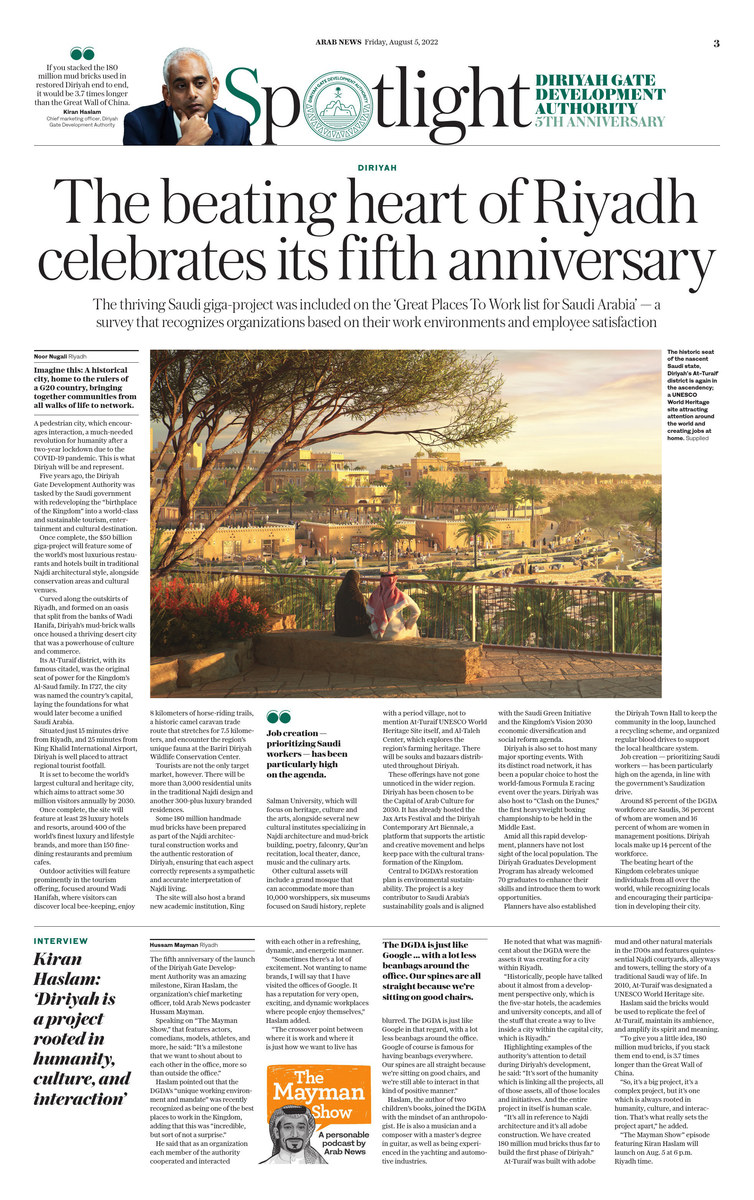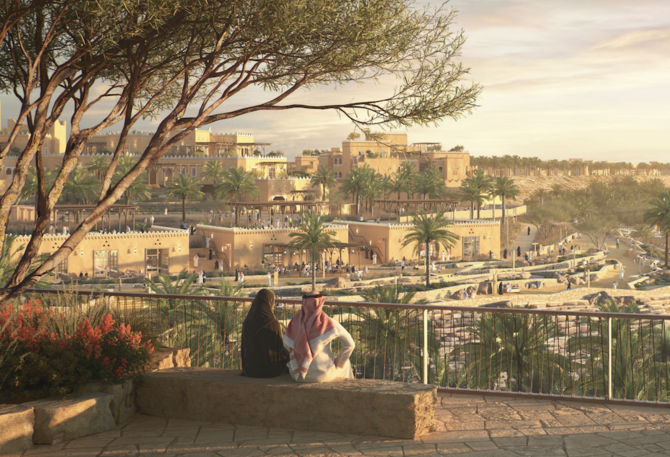RIYADH: Imagine this: a historical city, home to the rulers of a G20 country, bringing together communities from all walks of life to network. A pedestrian city, which encourages interaction and friendly engagements, a much-needed revolution for humanity after a two-year lockdown due to the COVID-19 pandemic. This is what Diriyah will become and represent.
Five years ago, the Diriyah Gate Development Authority (DGDA) was tasked by the Saudi government with redeveloping the “birthplace of the Kingdom” into a world-class and sustainable tourism, entertainment and cultural destination.
Once complete, the $50 billion giga-project will feature some of the world’s most luxurious restaurants and hotels built in traditional Najdi architectural style, alongside conservation areas and cultural venues.
Curved along the outskirts of Riyadh, and formed on an oasis that split from the banks of Wadi Hanifa, Diriyah’s mud-brick walls once housed a thriving desert city that was a powerhouse of culture and commerce.
Its At-Turaif district, with its famous citadel, was the original seat of power for the Kingdom’s Al-Saud family. In 1727, the city was named the country’s capital, laying the foundations for what would later become a unified Saudi Arabia.

Situated just 15 minutes drive from Riyadh, and 25 minutes from King Khalid International Airport, Diriyah Gate is well placed to attract regional tourist footfall. (Supplied)
In 2010, almost three centuries later, the ruins of At-Turaif were designated a UNESCO World Heritage site. Then, in July 2017, the area became the subject of a painstaking restoration plan aimed at bringing its historical legacy back to life.
“Nestled around the Jewel of the Kingdom, the UNESCO World Heritage site At-Turaif, birthplace of the Kingdom and former home of the Al-Saud royal family, Diriyah holds an incredibly special place in the landscape of the Kingdom of Saudi Arabia,” said Jerry Inzerillo, group CEO of the Diriyah Gate Development Authority. “It will be an iconic tourist destination and be synonymous with where the Kingdom and wider Arabian Peninsula’s story began.”
One of the core aims of the development of Diriyah is to stimulate domestic, regional and international tourism by creating world-class leisure, hospitality and retail offerings in a setting that celebrates both the Kingdom’s distinctive natural beauty and its rich culture. “We know that tourists are educated, more skilled, savvier, and sharper than ever before, and are on the hunt for experiences that cannot be found anywhere else,” said Inzerillo.
“They want to be pioneers, not only visiting places that offer things that were not possible before, but also offer an authentic cultural experience. It is now more important than ever that our industry caters to these worldly, curious travelers by curating destinations that will satiate their appetite for the new and the authentic.”
Situated just 15 minutes drive from Riyadh, and 25 minutes from King Khalid International Airport, Diriyah Gate is well placed to attract regional tourist footfall.
Sitting at the intersection between Europe, Asia and Africa, it is also a mere 8-hour flight from 70 percent of the world’s population, and just 4 hours from 30 percent of the world’s population. The 11 sq. km mixed-use cultural, historic and lifestyle destination is set to become the world’s largest cultural and heritage city, which aims to attract some 30 million visitors annually by 2030.

Other cultural assets will include a grand mosque that can accommodate more than 10,000 worshippers, six museums focused on Saudi history, replete with a period village. (Supplied)
Once complete, the site will feature at least 28 luxury hotels and resorts, around 400 of the world’s finest luxury and lifestyle brands, and more than 150 fine-dining restaurants and premium cafes.
Outdoor activities will feature prominently in the tourism offering, focused around Wadi Hanifah, where visitors can discover local bee-keeping, enjoy 8 km of horse-riding trails, an historic camel caravan trade route that stretches for 7.5 km, and encounter the region’s unique fauna at the Bariri Diriyah Wildlife Conservation Center.
Tourists are not the only target market, however. There will be more than 3,000 residential units in the traditional Najdi design and another 300-plus luxury branded residences.
Some 180 million handmade mud bricks have been prepared as part of the Najdi architectural construction works and the authentic restoration of Diriyah, ensuring that each aspect correctly represents a sympathetic and accurate interpretation of Najdi living.
The site will also host a brand new academic institution, King Salman University, which will focus on heritage, culture and the arts, alongside several new cultural institutes specializing in Najdi architecture and mud-brick building, poetry, falconry, Qur’an recitation, local theater, dance, music and the culinary arts.
Other cultural assets will include a grand mosque that can accommodate more than 10,000 worshippers, six museums focused on Saudi history, replete with a period village, not to mention the Al-Turaif UNESCO World Heritage site itself, and the Al-Taleh Center, which explores the region’s farming heritage. There will be souks and bazaars distributed throughout Diriyah.

Once complete, the site will feature at least 28 luxury hotels and resorts, around 400 of the world’s finest luxury and lifestyle brands, and more than 150 fine-dining restaurants and premium cafes. (Supplied)
These offerings have not gone unnoticed in the wider region. Diriyah has been chosen to be the Capital of Arab Culture for 2030. It has already hosted the Jax Arts Festival and the Diriyah Contemporary Art Biennale, a platform that supports the artistic and creative movement and helps keep pace with the cultural transformation of the Kingdom. “Culture and heritage is at the foundation of all we do at Diriyah and is weaved into our strategy at every stage of the development,” said Inzerillo.
“Our starting point is always that Diriyah is, first and foremost, a place of culture. That is what sets us apart from any other mixed-use development or any other giga-project; the fact that we at DGDA are the custodians of this magnificent piece of Saudi heritage that we have the privilege of preserving, sharing, and celebrating with the world.”
Central to this restoration plan is environmental sustainability.
The project is a key contributor to Saudi Arabia’s sustainability goals and is aligned with the Saudi Green Initiative and the Kingdom’s Vision 2030 economic diversification and social reform agenda.
Native and drought-tolerant species have been used in the site’s landscaping, reducing irrigation demand and thereby saving water. Wadis and escarpments within the project are also being rehabilitated and protected, including Wadi Hanifah’s historic date palm farms.
Meanwhile, DGDA says it is contributing to the reduction of carbon emissions. These efforts already seem to be paying off. DGDA was recently awarded the LEED for Cities and Communities platinum precertification for the first phase of the Diriyah development, in recognition of its progress toward sustainability, net-zero and equity objectives.
Embracing its outdoor space, the development will feature an open-air square with more than 20 open-air event spaces, a 3-km escarpment walk overlooking Wadi Hanifah and At-Turaif, and more than 2 sq. km of Wadi Hanifah parkland, filled with original and newly planted palms and children’s playgrounds. With health, fitness and wellbeing in mind, planners are also building a sports and recreation center, and more than 9 km of cycling trails.
Opinion
This section contains relevant reference points, placed in (Opinion field)
Diriyah is also set to host many more major sporting events. With its distinct road network, it has been a popular choice to host this world-famous Formula E racing event over the years. Diriyah was also host to “Clash on the Dunes,” the first heavyweight boxing championship to be held in the Middle East. Sporting brands are not the only big names drawn to Diriyah. The site recently hosted an exhibition by Cartier, one of the world’s most prestigious jewelry houses.
Amid all this rapid development, planners have not lost sight of the local population. The Diriyah Graduates Development Program has already welcomed 70 graduates to enhance their skills and introduce them to work opportunities.
Planners have also established the Diriyah Town Hall to keep the community in the loop, launched a recycling scheme, and organized regular blood drives to support the local healthcare system.
“One thing I am particularly proud of is DGDA’s commitment to, and achievements in, enabling the people of Diriyah to achieve their goals,” said Inzerillo. “DGDA has and continues to celebrate the local community, showcasing social, cultural, and historical achievements, connecting with the roots of the Saudi state, and creating solid foundations on which to build the best possible future for the community.”
Job creation — prioritizing Saudi workers — has been particularly high on the agenda, in line with the government’s Saudization drive.
Around 85 percent of the DGDA workforce are Saudis, 36 percent of whom are women and 16 percent of whom are women in management positions. People from Diriyah itself make up 14 percent of the workforce.
READ MORE
The fifth anniversary of the launch of the Diriyah Gate Development Authority was an amazing milestone, Kiran Haslam, the organization’s chief marketing officer, told the Arab News podcast “The Mayman Show.” Click here.
The beating heart of the Kingdom celebrates unique individuals from all over the world, while still recognizing the locals and encouraging them to participate in the development of their beloved city.
Since September 2020, the DGDA has more than doubled its staffing headcount, today employing more than 1,000 people. It was included on the “Great Place To Work” list for Saudi Arabia — a global survey that recognizes organizations based on their work environments and employee satisfaction. For Inzerillo, an important measure of the project’s success will be its economic impact.
“Over the longer term, success will be once Diriyah positively contributes to the Kingdom’s GDP, creates an estimated 55,000 jobs, and attracts our target of 30 million visitors a year,” he said. However, imbuing a sense of national pride among ordinary Saudis is by far the biggest prize of all.
“Diriyah is more than a giga-project. Diriyah is critical, because it anchors the Kingdom on its identity and on its soul, and the soul cannot be measured with money,” he said.
“The soul is measured on its culture and its people. That’s why it’s very important.”

















